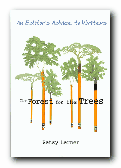advice to writers – from an experienced editor
All authors, editors and publishers should read this book. Even those who think they know all about writing and the publishing process will find fresh ideas and perceptive insights. Betsy Lerner has a wealth of experience, from her youthful beginnings at Simon & Schuster to becoming executive editor at Doubleday and now as a literary agent. She writes with style, empathy, wit, realism, and above all humanity. In The Forest for the Trees she identifies five ‘writer types’, all of them familiar.
 The Ambivalent Writer is one who can’t commit to a one idea for a story from the many possibles and who does not realise that writing is 90 per cent sheer sticking power. The Natural Writer is the one for whom writing appears to come easily. Or is that the myth of not realising that hard writing makes easy reading? Lerner’s definition of the ‘natural’ is one who is always writing. She cites Thurber who never quite knew when he was or wasn’t at it, ‘Sometimes my wife comes up to me at a party and says, “Dammit, Thurber, stop writing.”‘ For ‘natural’, maybe one should read ‘persistent’.
The Ambivalent Writer is one who can’t commit to a one idea for a story from the many possibles and who does not realise that writing is 90 per cent sheer sticking power. The Natural Writer is the one for whom writing appears to come easily. Or is that the myth of not realising that hard writing makes easy reading? Lerner’s definition of the ‘natural’ is one who is always writing. She cites Thurber who never quite knew when he was or wasn’t at it, ‘Sometimes my wife comes up to me at a party and says, “Dammit, Thurber, stop writing.”‘ For ‘natural’, maybe one should read ‘persistent’.
The Wicked Child relies on ‘kiss-and-tell’: someone who exposes family relationships, friends, acquaintances (or even, like Philip Roth, a whole tribe) in a more or less disguised fashion. personal relationships. The Self-promoter will do anything for fame – there are many such writers today, but it is a shock to realise that Walt Whitman shamelessly trumpeted himself from the roof-tops and sucked up to celebrity writers of the day. Emily Dickinson on the other hand died with 2000 poems unpublished .
The Neurotic makes a great fuss about the process itself – writing has to be done with an HB pencil, or on lined paper of exactly the right width. Few of these quirks are as eccentric as Dame Edith Sitwell who needed to start the day’s work by lying in an open coffin, but every reader will recognise such stalling techniques.
The second half of the book deals with the publishing process – everything from finding an agent to the book jacket and sales conference. Authors should be aware of what editors are looking for and what they can realistically expect from a publishing house. It would seem that a wad of rejection letters followed eventually by a book without a launch party and no reviews is completely the norm. And if authors turn up to read their books in local bookshops only to find they haven’t got any copies to sell, that’s par for the course too.
Naturally every author is looking for validation, but ten per cent of all titles earn ninety per cent of all revenues. Publishers are clearly going to concentrate on those at the top of their lists. Yet the truth seems to be that even the publishers don’t know which books are going to be in that top ten per cent. If they did, they probably wouldn’t print any of the others at all.
Lerner concludes: ‘Most of the disappointment that writers experience in having a book published can be traced back to their initial expectations – what most writers don’t understand … is that landing a contract and being published do not guarantee the fulfillment of all their hopes and dreams.’
Why do we do it?
© Jane Dorner 2004
Betsy Learner, The Forest for the Trees: An Editor’s Advice to Writers, New York: Riverhead Books/Penguin Putnam, revised and updated edition 2010, pp.304, ISBN: 159448483X
More on creative writing
More on writing skills
More on publishing